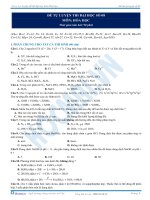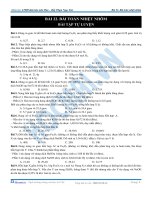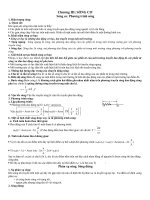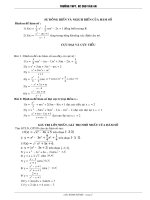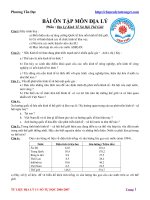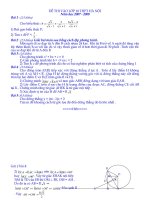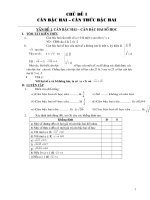- Trang chủ >>
- Y - Dược >>
- Sản phụ khoa
tài liệu ôn tập
Bạn đang xem bản rút gọn của tài liệu. Xem và tải ngay bản đầy đủ của tài liệu tại đây (180.76 KB, 15 trang )
<span class='text_page_counter'>(1)</span><div class='page_container' data-page=1>
<b>BÀI TẬP ÔN TẬP TIẾNG ANH 6 UNIT 7- UNIT 8</b>
<b>Unit 7: TELEVISION</b>
<b>A. GRAMMAR - NGỮ PHÁP</b>
<b>I.Wh – questions</b>
<b>1. WHO hoặc WHAT: Câu hỏi chủ ngữ</b>
- Đây là câu hỏi khi muốn biết chủ ngữ hay chủ thể của hành động.
Who
verb + ...
What
Ví dụ:
Who is the favourite VTV newsreader this year?
<i><b>(Ai là phát thanh viên đài VTV được yêu thích năm nay?)</b></i>
<i><b>Who is making television programmes? (Ai tạo ra chương trình truyền hình?)</b></i>
<b>2. WHOM hoặc WHAT: Câu hỏi tân ngữ</b>
Đây là câu hỏi khi muốn biết tân ngữ hay đối tượng tác động của hành động.
Whom
Trợ động từ: do/ does/ did/ ... S + V + ...
What
Ví dụ:
What kind of TV programme do you like most?
<i><b>(Chương trình tivi nào mà bạn thích nhất?)</b></i>
<i><b>Whom did she meet yesterday? (Hôm qua, cô ấy đã gặp ai?)</b></i>
<b>3. WHEN, WHERE, HOW và WHY: Câu hỏi bổ ngữ</b>
Đây là câu hỏi khi muốn biết nơi chốn, thời gian, lý do, cách thức của hành động.
When
Trợ động từ: do/ does/ did/ ... S + V + ...
Where
How
Why
Ví dụ:
</div>
<span class='text_page_counter'>(2)</span><div class='page_container' data-page=2>
<i><b>(Tại sao trẻ con lại thích chương trình hoạt hình?)</b></i>
Where is the studio of Vietnam television?
(Trường quay của Đài truyền hình Việt Nam ở đâu?)
<b>4. Bài tập áp dụng</b>
<b>I.Put in What, Where, Why, When into the gaps and form meaningful questions.</b>
<b>do you like best?</b>
1……….do you like best?
2…………does Bill get up in the morning?
3…………. don't you go by bus, Max?
4………….hobbies does Andrew have?
5………. do they go to every week?
6………. is Mike?
7……….is Susan's birthday?
8………are my exercise books?
9…………. are you doing at the moment, Sally?
10………does the Robinsons live?
Keys:
1.What 2.When 3.Why 4.What 5.Where 6.Where 7.When
8.Where 9.What 10.Where
<b>II.Fill in the blanks with What, When or Where</b>
<b>1. _________ is the name of the President of the United States of America?</b>
<b>2. _________ month is the Chinese new year?</b>
<b>3. _________did Neil Armstrong say when he first landed on the moon?</b>
<b>4. _________did he first land?</b>
<b>5. _________ did the Americans drop the atomic bomb on Hiroshima?</b>
<b>6. _________is New York city?</b>
</div>
<span class='text_page_counter'>(3)</span><div class='page_container' data-page=3>
<b>9. _________are you doing this afternoon?</b>
Keys
1. _WHAT_is the name of the President of the United States of America?
2. _WHAT_month is the Chinese new year?
3. _WHAT_did Neil Armstrong say when he first landed on the moon?
“That was one small step for man, one giant leap for mankind.”
4. _WHEN__did he first land?
5. _WHEN_did the Americans drop the atomic bomb on Hiroshima?
6. _WHERE_is New York city?
7. _WHAT_is that called in English?
8. _WHERE_are the Hawaiian Islands?
9. _WHAT_are you doing this afternoon?
<b>II. CONJUNCTIONS</b>
<b>1. Các liên t c b n</b>ừ ơ ả
<b>Liên từ</b> <b>Nghĩa</b> <b>Ví dụ</b>
and Và I like watching news and game show.
or hoặc Hurry up, or you will be late.
but Nhưng My father likes horror films but my mother doesn't like them
because bởi vì My sister likes sitcom because it is very interesting.
although mặc dù Although he likes football, he doesn't often watch football
programmes.
so Nên I'm listening to music, so I can't hear what you are saying.
<b>2. Bài tập áp dụng</b>
<b>I.Sử dụng liên từ trong dấu ngoặc để kết hợp câu.</b>
</div>
<span class='text_page_counter'>(4)</span><div class='page_container' data-page=4>
2.I have watched The Seven Kitties many times. I like the film so much. (because)
→ _____________________________________
3.BBC One is a British channel. VTV6 is a Vietnamese channel. (but)
→ _____________________________________
4.Along the Coast is a famous TV series. I have never watched it. (although)
→ _____________________________________
5.I have a lot of homework tonight. I can’t watch Eight Feet Below. (so)
→ _____________________________________
<b>Key:</b>
1.Ocean Life is on at 7.30 and Laughing out Loud will follow, at 8.00.
2.I have watched The Seven Kitties many times because I like the film so much.
3.BBC One is a British channel but VTV6 is Vietnamese channel.
4.Although Along the Coast is a famous TV series, I have never watched it.
5.I have a lot of homework tonight, so I can’t watch Eight Feet Below.
<b>II.Sử dụng liên từ để kết hợp thành câu hoàn chỉnh</b>
1.Both my sister ______ I dream of becoming a TV MC.
2.My sister’s good at school ______ I am not.
3.______ we tried our best, we didn’t win the game.
4.Peter stayed at home ______ he was ill.
5.I am tired, ______ I will go to bed early
<b>Key:</b>
1.and 2. but 3. Although 4. because 5. So
<b>B.VOCABULARY</b>- T V NGỪ Ự
</div>
<span class='text_page_counter'>(5)</span><div class='page_container' data-page=5>
action film phim hành động
animals programme chương trình thế giới động vật
Audience khán giả
Cameraman chuyên viên quay phim
Channel kênh
Character nhân vật
chat show chương trình tán gẫu
Comedy kịch vui, hài kịch
Designer nhà thiết kế
Director giám đốc sản xuất
Documentaries phim tài liệu
game show trị chơi truyền hình
historical drama phim, kịch lịch sử
horror film phim kinh dị
MC người dẫn chương trình
News bản tin thời sự
Newsreader phát thanh viên
Producer nhà sản xuất
quiz show trò chơi đố vui
reality show chương trình truyền hình thực tế
remote control điều khiển
Reporter phóng viên
romantic film phim lãng mạn
Sitcom tình huống hài kịch (là từ kết hợp của
situation và comedy)
</div>
<span class='text_page_counter'>(6)</span><div class='page_container' data-page=6>
Viewer khán giả
war film phim chiến tranh
weather forecast bản tin dự báo thời tiết
Weatherman người đọc tin dự báo thời tiết
<b>Unit 8: Sports and Games</b>
<b>A.GRAMMAR - NGỮ PHÁP</b>
<b>I. Thì quá khứ đơn Past simple</b>
<b>1. Cách dùng</b>
Chúng ta sẽ sử dụng thì quá khứ đơn trong những trường hợp sau:
- Dùng để diễn tả một hành động đã xảy ra và kết thúc trong quá khứ.
Ví dụ: They went to the concert last night. (Họ đã tới rạp hát tối hôm qua.)
- Diễn tả một sự việc xảy ra trong một khoảng thời gian trong quá khứ và đã kết thúc hoàn
toàn ở hiện tại.
Ví dụ: When I was young, I often played soccer. (Khi tơi cịn trẻ, tơi thường chơi đá bóng).
- Diễn tả một loạt hành động xảy ra kế tiếp nhau trong quá khứ
Ví dụ: She came home, switched on the computer and checked information.
(Cô ấy về nhà, khởi động máy tính và kiểm tra hộp thư điện tử của mình.)
- Diễn tả một hành động chen ngang vào hành động khác đang xảy ra trong quá khứ (quá
khứ đơn dùng kết hợp với quá khứ tiếp diễn)
</div>
<span class='text_page_counter'>(7)</span><div class='page_container' data-page=7>
<b>2. Cấu trúc</b>
<b>a. Với động từ thường</b>
(+) Khẳng định: S + V-ed/P1 + O.
(-) Phủ định: S + didn't + V + O.
(?) Hỏi:
o Wh-question + did + S + V?
<i><b>o Did + S + V...? Yes/No, S + did/didn't</b></i>
<b>b. Với động từ tobe</b>
(+) Khẳng định: S + was/were + Adj/N
(-) Phủ định: S + wasn't/ weren't + Adj/N
(?) Hỏi:
Wh question + was/were + S?
Was/were + S + Adj/N?
<b>c. Lưu ý:</b>
P1: Động từ chia ở thì quá khứ, cột thứ 2 trong bảng động từ bất quy tắc. Còn lại thêm
-ed
Động từ tobe "was" đi với các chủ ngữ số ít: she, he, it, tên riêng...
Động từ tobe "were" đi với các chủ ngữ số nhiều : you, we, they...
<b>3. Dấu hiệu nhận biết</b>
Khi trong câu xuất hiện các dấu hiệu sau, ta chia ờ thì quá khứ đơn:
</div>
<span class='text_page_counter'>(8)</span><div class='page_container' data-page=8>
Ngoài ra bạn nên chú ý đến các từ chỉ thời gian quá khứ khác và ngữ cảnh của câu
nói.
<b>4. Bài tập vận dụng</b>
<b>Bài tập 1: Viết lại thành câu hoàn chỉnh:</b>
1. It/ be/ cloudy/ yesterday.
2. In 1990/ we/ move/ to another city.
3. When/ you/ get/ the first gift?
4.She/ not/ go/ to the church/ five days ago.
5. How/ be/ he/ yesterday?
6. and Mrs. James/ come back home/ and/ have/ lunch/ late/ last night?
7. They/ happy/ last holiday ?
8. How/ you/ get there?
9. I/ play/ football/ last/ Sunday.
10. My/ mother/ make/ two/ cake/ four/ day/ ago.
<b>Đáp án :</b>
1. It was cloudy yesterday.
2. In 1990, we moved to another city.
3. When did you get the first gift?
4. She did not go to the church five days ago.|She didn't go to the church five days ago.
5. How was he yesterday?
</div>
<span class='text_page_counter'>(9)</span><div class='page_container' data-page=9>
7. Were they happy last holiday?
8. How did you get there?
9. I played football last Sunday.
10. My mother made two cakes four days ago.
<b>Bài tập 2:Chia động từ trong ngoặc ở thì quá khứ đơn.</b>
1. She (spend) ____ all her money last week.
2. Mum (not spend) ___________ any money on herself.
3. I (lend) __________ my penknife to someone, but I can't remember who it was now.
4. John and his father (build) ___________ the cabin themselves last year.
5. My parents (sell) ____________ the stereo at a garage sale.
6. ___________You (tell) ___________ anyone about this yesterday?
7. The unidentified plant (bear) ___________ gorgeous flowers.
8. She (tear) ___________ the letter to pieces and threw it in the bin.
9. He often (wear) ___________ glasses for reading.
10. Before God He (swear) ___________ he was innocent
11. Yesterday Clouds (creep) ___________ across the horizon, just above the line of trees.
12. We both (sleep) ___________ badly that night.
13. She (weep) ___________ for the loss of her mother.
14. Jane (keep) ___________ the engine running.
15. A huge wave (sweep) ___________ over the deck
16. Mum (pay) ___________ for my driving lessons.
17. He (lay) ___________ his hand on my shoulder.
18. He (break) ___________ the biscuit in half and handed one piece to me.
19. He (choose) ___________ his words carefully as he (speak) ___________.
20. He ...to the zoo last Sunday (go)
21. She (not/ watch)...TV last night
22. They (meet)...their friends at the movie theater last week
23. What...you (do)...last night
24. ... they (buy)...a new car two days ago?
25. We ... (have) a lot of homework yesterday.
Đáp án:
</div>
<span class='text_page_counter'>(10)</span><div class='page_container' data-page=10>
21 - didn't
watch 22 - met 23 - did ... do 24 - Did ... buy 25 - had
<b>II.Câu mệnh lệnh Imperative</b>
<b>1. Khái niệm</b>
Câu mệnh lệnh cịn gọi là câu cầu khiến, có tính chất sai bảo, yêu cầu hoặc ra lệnh cho
người khác. Chủ ngữ của câu mệnh lệnh được ngầm hiểu là "you" (bạn)
Ví dụ:
o Close the door! (Đóng cửa lại đi)
o Open the book! (Mở sách ra)
o He asked me to turn on the light. (Anh ấy yêu cầu tôi mở đèn lên)
<b>2. Phân loại</b>
Câu mệnh lệnh thường được chia làm 2 loại: Trực tiếp & Gián tiếp
Câu mệnh lệnh trực tiếp: Một số câu mệnh lệnh trực tiếp như sau:
o Close the door . (Đóng cửa lại.)
o Please turn off the light. (Làm ơn hãy tắt đèn đi.)
o Open the window. (Mở cửa sổ ra)
o Be quiet. (Yên lặng)
o Give me your jewelry! Don’t move (Hãy tặng tơi món đồ nữ trang của bạn!
Đừng lấy đi)
</div>
<span class='text_page_counter'>(11)</span><div class='page_container' data-page=11>
Câu mệnh lệnh gián tiếp: thường được dùng với <i><b>to order/ ask/ say/ tell + O + to</b></i>
<i><b>V. </b></i>
o order: ra lệnh, ask: yêu cầu, tell: nói, say: nói, bảo...
o Ví dụ: My teacher order our to open the book (Giáo viên ra lệnh cho chúng tôi
mở sách ra).
<b>3. Dạng phủ định của câu mệnh lệnh</b>
Trong câu mệnh lệnh, khi muốn phủ định, chúng ta áp dụng 2 nguyên tắc sau:
Thêm <i><b>don't</b></i> vào trước động từ trong câu trực tiếp.
Ví dụ: <b>Don't </b>move! Or I will shoot. (Đứng im. Không tao bắn)
Thêm not vào trước động từ nguyên thể trong câu gián tiếp
Ví dụ: I ordered him not to open the door (Tôi yêu cầu anh ấy không được mở cửa)
<b>4. Bài tập áp dụng</b>
<b>Bài tập 1: Chuyển những câu sau sang tiếng anh dạng câu mệnh lệnh</b>
1. Hãy giữ bình tĩnh!
2. Đừng vội!
3. Nhanh lên!
4. Tôi yêu cầu anh ấy trả lại tiền
<b>Bài tập 2: Chuyển các câu sau thành câu mệnh lệnh phủ định</b>
1. Turn off the light When you go out. -> ...
2. Be silly. I will come back. -> ...
</div>
<span class='text_page_counter'>(12)</span><div class='page_container' data-page=12>
5. My mother ordered me to clean my room. -> ...
<i><b>Bài tập 3: Điền động từ thích hợp vào chỗ trống</b></i>
<i>Cho các từ sau: open, come, forget, be, bring, have, turn, wait, make.</i>
Ví dụ: (0): come
36, Sea Parade
Liverpool
Dear John,
__(0) __ and see me next weekend. I’m staying in a house by the sea. Don’t
(1)______________ to bring your swimming costume with you! It isn’t difficult to find the
house .
When you get to the crossroads in the town, (2)_________________ right and drive to the
end of the road. (3)_____________ careful because it is a dangerous road! (4)__________
some warm clothes with you because it is cold in the evenings here. If I am not at home
when you arrive, don’t (5)_____________ for me. The key to the house is under the big
white stone in the garden.
(6)_____________ the front door and (7)______________ yourself a cup of tea in the
kitchen!
(8)_____________ a good journey!
Best wishes,
Tom
<b>ĐÁP ÁN:</b>
<b>Bài tập 1:</b>
1. Keep calm!
2. Don't hurry!
3. Hurry!
</div>
<span class='text_page_counter'>(13)</span><div class='page_container' data-page=13>
<i>1. Don't turn off the light When you go out. </i>
<i>2. Don't be silly. I will come back. </i>
<i>3. John asked me not to turn off the radio. </i>
<i>4. Please tell her not to leave the room. </i>
<i>5. My mother ordered me not to clean my room.</i>
<b>Bài tập 3:</b>
1. Forget
2. Turn
3. Be
4. Bring
5. Wait
6. Open
7. Make
8. Have
<b>B. VOCABULARY - TỪ VỰNG-SPORTS AND GAMES</b>
<b>Thể thao và trò chơi</b>
athletics (n) điền kinh
boxing (n) đấm bốc
canoeing (n) chèo thuyền ca-nô
mountain climbing (n) leo núi
cycling (n) đua xe đạp
fishing (n) câu cá
golf (n) đánh gôn
hockey (n) khúc côn cầu
horse racing (n) đua ngựa
ice hockey (n) khúc côn cầu trên sân băng
ice skating (n) trượt băng
</div>
<span class='text_page_counter'>(14)</span><div class='page_container' data-page=14>
motor racing (n) đua mơ tơ
rugby (n) bóng bầu dục
sailing (n) chèo thuyền
scuba diving (n) lặn có bình khí
skateboarding (n) trượt ván
weightlifting (n) cử tạ
windsurfing (n) lướt ván buồm
wrestling (n) môn đấu vật
badminton racquet (n) vợt cầu lơng
baseball bat (n) gậy bóng chày
boxing gloves (n) găng tay đấm bốc
fishing rod (n) cần câu cá
football boots (n) giày đá bóng
golf club (n) gậy đánh gôn
hockey stick (n) gậy chơi khúc côn cầu
score (n) tỉ số
winner (n) người thắng cuộc
loser (n) người thua cuộc
opponent (n) đối thủ
umpire (n) trọng tài
spectator (n) khán giả
victory (n) chiến thắng
to win (v) thắng
to lose (v) thua
to draw (v) hịa
match (n) trận đấu
bare (adj) trần, khơng mang giày (chân)
care (v) chăm sóc
dare (v) dám
fare (n) tiền vé
air (n) khơng khí
fair (adj) cơng bằng
hair (n) tóc
pair (n) cặp đơi
bear (n) con gấu
pear (n) trái lê
</div>
<span class='text_page_counter'>(15)</span><div class='page_container' data-page=15>
tear (n) nước mắt
clear (adj) rõ ràng
real (adj) thực tế
fear (n) sự sợ hãi
beer (n) bia
</div>
<!--links-->

